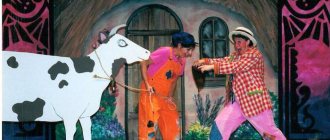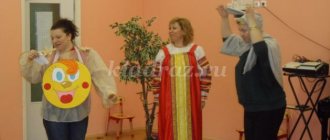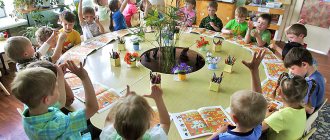Copyright
Step-by-step instructions on how to come up with a name for a children's theater studio using a real case as an example. Follow the algorithm and you will generate many interesting name options.
Preparatory stage
At the kick-off meeting we decided on what language the name should be in and what it should express. Don't ignore this step. Having correctly set the task, you can then compare the invented options with it and choose a favorite. For example, look at my brief - a list of questions that I ask a client who wants to order the development of a name from the Name is naming agency. Give yourself answers to these questions, it's really important.
The most important semes. A good name is at their intersection.
First stage: express analysis of competitors' names.
Using a search on the Internet (using Odessa resources) and in the electronic city directory, I received the following list of names:
I came across the fact that many theater studios are nameless; they operate at various children's centers, clubs, academies, and schools. Just in case, I recorded the names of these institutions, because if necessary, theater studios can use them for their identification.
The selection by search query randomly includes the Kyiv theater studios “ArtEko” and “Mkhatik”. I leave their names for analysis.
I also paid attention to the descriptors (clarifications, additions, descriptions) in the names. It turns out that theater studios and children's clubs are the most common, followed by centers and schools.
I started working by classifying names to understand which cluster was the most populated. I got the following groups:
Heroes of books, cartoons, corporate characters:
“Znayka”, “Willy-Winky”, “Chunga-Changa”, “Simba”, “Goldfish”, “Locomotive” (if you meant “Locomotive from Romashkovo”)
One of the tools used in the formation of names is diminutive forms:
“Merry Family”, “Balaganchik”, “Locomotive”, “Mkhatik”, “Domisolka”
Based on the analysis, it can be seen that the lexical cluster of theatrical terminology is practically empty, in contrast, for example, to the cluster with the names of cartoon characters and book heroes. I note this for myself as the most promising direction, because one of the requirements of the brief is that the name must be related to the theater.
There are very few studios whose names have a theatrical component
Second stage: drawing up a search map, delineating semantic fields.
I am identifying topics in which to search for a name for our theater and variety studio.
The outlined thematic blocks structure the search and guide the creative process.
Third stage: working out each part of the map.
At this stage, I filter out only obviously unsuitable options; I write down the rest according to the rules of brainstorming, without criticizing.
For example, this is the set of lexemes for the blocks “Theater Terminology” and “Theatrical Objects”
Source
Club formations, clubs, theater studios
Home — About CBC — Club formations, clubs, theater studios
List of club formations of St. Petersburg State Budgetary Institution of Culture "Central Sports Club of the Kirov District" as of 02/01/2020
| № | Name | Supervisor | Library |
| Club formations for adults free of charge | |||
| 1. | “Computer is easy” computer courses for seniors | Kvasova Elena Aleksandrovna Leading librarian | Central District Hospital named after. M. Sholokhova |
| 2. | “Computer is easy” computer courses for seniors | Kovaleva Olga Mikhailovna, librarian | Library No. 1 |
| 3. | "My favorite movie" | Eliseev Alexey Nikolaevich, leading librarian | Library No. 1 |
| 4. | "Learning English" | Maletina Svetlana Valentinovna | Library No. 1 |
| 5. | Poetry club "Living Word" | Kovaleva Olga Mikhailovna, librarian | Library No. 1 |
| 6. | Ladies' club "Inspiration" | Bakalova Larisa Mikhailovna, librarian | Library No. 1 |
| 7. | Providing consultations with elements of computer literacy training "Krasnoputilovskaya.doc" | Filippova Tatyana Vladimirovna, head. library | Library No. 2 |
| 8. | Club "BiblioCafe" | Kirillova Larisa Stepanovna, supervisor. librarian | Library No. 2 |
| 9. | “Computer is easy” computer courses for seniors | Nikitina Tamara Ivanovna, librarian, Romanova Ekaterina Vyacheslavovna, librarian | Library No. 4 |
| 10. | Studio of public speaking "Logos" | Pogosyan Larisa Viktorovna, director | Library No. 4 |
| 11. | Club association "Teatral" | Kropacheva Lesya Valerievna, leading librarian | Library No. 4 |
| 12. | Creative association of the author's song "Poems on Strings" | Piskunov Oleg Petrovich | Library No. 4 |
| 13. | "Story Theater" | Ivanov I. S. | Library No. 4 |
| 14. | "Reading Wednesday" | Mirieva Tatyana Dmitrievna, leading librarian | Library No. 5 |
| Club formations for children free of charge | |||
| 15. | Club "Hamster's Workshop" | Bakhmutova Natalia Leonidovna, leading librarian | Central Children's Hospital named after V. Golyavkina |
| 16. | Weekend club “Read me a book” | Krestyankina Kira Sergeevna, librarian | Central Children's Hospital named after V. Golyavkina |
| 17. | Theater-studio "Alexandrino" | Belousova Alla Vitalievna, director | Central Children's Hospital named after V. Golyavkina |
| 18. | Children's theater studio "Cardboard House" | Kropacheva Lesya Valerievna, leading librarian | Library No. 4 |
| 19. | "We are learning Russian" | Vinogradova N.V. | Library No. 5 |
| 20. | Club "Young Petersburger" | Stepanova Svetlana Dmitrievna, head. library | Library No. 6 |
| 21. | Creative workshop “Create, invent, try” | Nikonorova O. Yu., leading librarian | Library No. 6 |
| 22. | Club "Lesovichok" | Avseenko Natalya Grigornvna, librarian | Library No. 7 |
| Club formations for children on a paid basis | |||
| 23. | English for children “English CLUB” | Surkova Elena Stepanovna | Library No. 2 |
| 24. | Circle "Stars" | Leonova Evgenia Vladimirovna | Library No. 2 |
| 25. | Drawing circle “Creative Workshop” for children | Ivanov Andrey Nikolaevich | Library No. 2 |
| 26. | "Modern dances" | Krasikov Nikolay Evgenievich | Library No. 4 |
| 27. | English "Oxford" (individual lessons) | Labuzova Tamara Ivanovna | Library No. 4 |
| 28. | English "Oxford" (group classes) | Labuzova Tamara Ivanovna | Library No. 4 |
| 29. | Theater group "Sunny Bunnies" | Kropacheva Lesya Valerievna | Library No. 4 |
| 30. | Sand therapy studio “Miracles on the sand” | Tikhonova Elena Leonidovna | Library No. 4 |
| 31. | Club "Merry Notes" | Ilyushnikova Yulia Yurievna | Library No. 4 |
| 32. | Art studio "Rainbow" | Koroleva Alexandra Viktorovna | Library No. 4 |
| 33. | Studio of artistic expression "Polyphony" | Pogosyan Larisa Viktorovna | Library No. 4 |
| 34. | Fine art studio "Sun" | Glebko Victoria Vladimirovna | Library Branch No. 4 |
| Club formations for adults on a paid basis | |||
| 35. | Drawing circle “Creative Workshop” for adults | Ivanov Andrey Nikolaevich | Library No. 2 |
Formulations:
“Club formation” is a voluntary association of people based on a commonality of interests, requests and needs in the pursuit of amateur, artistic and technical creativity in joint creative activities that contribute to the development of the talents of its participants, the development and creation of cultural values by them, as well as based on the unity of aspirations of people to obtain up-to-date information and applied knowledge in various fields of social life, culture, literature, art, science and technology, to master useful skills in the field of everyday culture and a healthy lifestyle. Club formations include amateur associations, interest clubs, folk art circles, applied knowledge and skills, courses, schools (not educational institutions), studios, sports sections, health groups, etc.
“Club” is a voluntary community of visitors with common interests.
“Circle” is a group of people with common interests who come together to do something together.
Small roles
- I like that it fully meets the original requirements. I like the subtext embedded in it.
- The name of the customer is not confirmed immediately. They interview relatives and friends, in particular mothers with children. Those express the point of view that such a name does not sell, that parents will not like it. Several days pass. They get used to the name, it takes root, they start using it. We decide to develop a logo and corporate identity, write texts for pages on social networks.
- It was a very easy and enjoyable project. Naming took place in one stage, which does not happen very often. I usually come up with names in two or three approaches, clarifying the wishes of customers and understanding them better after presenting the first options.
I'm wondering what you think of this title? How do you like it? Would you send your child to the Little Roles theater studio? Or perhaps you have your own favorite among the options offered? Write in the comments, I will be happy to discuss them.
The importance of additional education
Children attending the club acquire skills and abilities that help them study in secondary school. In addition, creative activities with a passionate, caring teacher make them more organized and manageable.
Fine motor skills, which develop well in such classes, make it possible to learn to write well and create beautiful handwriting. It is also known to be beneficial for children's mental performance.
The modern name of the arts and crafts club will attract the attention of children, they will be interested in going to it. In the process of creating a work of art, a little person will overcome difficulties: learn patience, learn about his capabilities.
The teacher will help you perform boring stages of work, such as a monotonous operation repeated many times, mechanically. Then your head is freed up for a conversation on an interesting topic. While the children are shading, gluing, cutting out something, the teacher is talking about a general topic.
Names suitable for the work program for preschoolers:
Instructions
When choosing a name for a theater group, be guided by the age of its participants. It would be appropriate to name a children's group (up to 14 years old) after one of the names of fairy-tale characters (“Cipollino”, “Pierrot”, “Ole-Lukoye”). Young theatergoers and older club members may not be against Hamlet, Don Quixote or even Figaro. Do not use the names of characters in books and films whose authors are in good health without their written permission (which is sometimes very difficult to do due to various legal subtleties, material costs, or, for example, the language barrier).
Think about who will come to your performances. If you plan to perform mainly in front of children, then the name of your theater group should be understandable to children, causing them positive emotions. For example, “Cheerful Carlson”, “Pinocchio and. However, the teenage and youth audience is quite picky. In this case, there is no need to choose a too pretentious name. And at the same time, it can be unusual and even shocking. For example, “We are together”, “Light and performance”, “Steps behind the stage”.
Take your future repertoire as a basis. So, if you are going to stage sketches, reprises, parodies, then it is possible that you will like the following titles: “The Fool With Us”, “Regulars”, “Balaganchik”, “Domino”. If you are going to focus on serious dramatic works, then the name of the circle should be appropriate: “Sphere”, “Mirror”, “Theme”, “Situation”, etc.
Select names that viewers and circle members associate with the theater, namely: - names of genres (“Drama”, “Reprise”, “Miniature”, “Interlude”) - names of structural units of works (“Phenomenon”, “Prologue”, “ Exposition")—terms related to work on the production and the design of the stage (“Mise-en-scène,” “Props,” “Decoration”)—terms related to the structure of the stage and auditorium (“Ramp,” “Backstage,” “Gallery” , "Parterre").
Decide whether it would be appropriate to call the theater group
in honor of famous playwrights or their plays. On the one hand, this means that you strive to meet a given level. But on the other hand, this may seem too pretentious, especially if the productions are not successful.
Don’t choose too long names and try to avoid qualitative adjectives (big, small, beautiful, wonderful, new, old, funny, sad, etc.). Or at least use them in such a way that the resulting phrase has at least some connection to art. For example, “New Century”, “Small Hall”, “Sad Image”.
Attention, TODAY only!
Everything interesting
In addition to the compulsory educational program, a kindergarten may provide additional educational services. One of these services is circle activities for children. You will need a separate room, sources of financing,…
Children's clubs at home or in rented premises are becoming an increasingly attractive alternative to kindergartens. Creating your own circle is quite simple, if, of course, you feel strong enough to do more than just your own...
Nothing amuses Internet regulars and freelancers more than questions and tasks related to plumbing. However, it’s not at all difficult to come up with quite decent names for a store that sells plumbing fixtures if you temporarily suppress your smile and...
Many entrepreneurs are often faced with the impossibility of coming up with original names for their stores. This is why naming specialists will never be left without work. Maybe it’s not worth spending money on their services just yet and giving it a try...
The name of a photo studio is one of the key elements of its future success. To choose the best option, it is enough to know a few rules and subtleties of naming. Look for a new, bright, expressive and at the same time simple name. To you…
Elsa, “Victoria”, “Olga”... Many wedding salons are named after women. On the one hand, a beautiful name may be suitable as a title. On the other hand, there are so many salons with such names that the clients themselves start going to them...
Children usually like it when a group, team or club has a name. It’s more pleasant to be in a group with the name “Sun” or “Teremok” than in a group with a regular number. In addition, for a group with a beautiful name you can…
The children's team is a group of children with diverse personal characteristics. Its popularity among children directly depends on its name. Instructions 1Name the children's group using diminutive words...
Teaching any subject begins with drawing up a program. It can be standard or original. It sets the goals and objectives of the work of a circle or studio, determines the range of topics and the number of classes for each section. Ministry of Education…
When organizing a musical group or vocal-instrumental ensemble at school, you should take care not only of the repertoire, premises or material resources. It is also important to come up with a name for the team that is beautiful and memorable. Instructions...
The name is the calling card of the group. You need to take his choice very seriously, because all performances will take place under this name. The name must be bright, recognizable and must be associated with the team members. Such questions…
Instructions
When choosing a name for a theater group, be guided by the age of its participants. It would be appropriate to name a children's group (up to 14 years old) after one of the names of fairy-tale characters (“Cipollino”, “Pierrot”, “Ole-Lukoye”). Young theatergoers and older club members may not be against Hamlet, Don Quixote or even Figaro. Do not use the names of characters in books and films whose authors are in good health without their written permission (which is sometimes very difficult to do due to various legal subtleties, material costs, or, for example, the language barrier).
Think about who will come to your performances. If you plan to perform mainly in front of, then the name of your theater group should be understandable to kids, causing them positive emotions. For example, “Cheerful Carlson”, “Pinocchio and. However, the teenage and youth audience is quite picky. In this case, there is no need to choose a too pretentious name. And at the same time, it can be unusual and even shocking. For example, “We are together”, “Light and performance”, “Steps behind the stage”.
Take your future repertoire as a basis. So, if you are going to stage sketches, reprises, parodies, then it is possible that you will like the following titles: “The Fool With Us”, “Regulars”, “Balaganchik”, “Domino”. If you are going to focus on serious dramatic works, then the name of the circle should be appropriate: “Sphere”, “Mirror”, “Theme”, “Situation”, etc.
Select the names that viewers and circle members associate with the theater, namely: - names of genres (“Drama”, “Reprise”, “Miniature”, “Interlude”); - names of structural units of works (“Phenomenon”, “Prologue”, “Exposition”); - terms related to work on the production and stage design (“Mise-en-scene”, “Props”, “Scenery”); - terms related to the structure of the stage and auditorium (“Ramp”, “Backstage”, "Gallery", "Parterre").
Decide whether it would be appropriate to name the drama group after famous playwrights or their plays. On the one hand, this means that you strive to meet a given level. But on the other hand, this may seem too pretentious, especially if the productions are not successful.
Don’t choose too long names and try to avoid qualitative adjectives (big, small, beautiful, wonderful, new, old, funny, sad, etc.). Or at least use them in such a way that the resulting phrase has at least some connection to art. For example, “New Century”, “Small Hall”, “Sad Image”.
Sources:
- name of children's circle
Opening a children's center is a good cause, and also profitable. The range of services provided by such centers is quite wide - training, medical services, entertainment and much more. But regardless of what exactly your children's center will do, it needs a good name.
Instructions
Based on the type of activity of your center. If this is an entertainment center with all kinds of slot machines, then the name should encourage active games and fun. If this is a child development center, then you don’t need anything harsh and annoying. It is better to thematically link the name to training and education. You can use Latin roots, but only well-known ones, so that no one has to look into dictionaries to decipher them. If this is a sports center, then the name needs to be active and energetic. Don’t forget about the age of the children for whom your center is designed. For the age category from 3 to 7 years you need one name, and from 7 to 18 - another. It is unlikely that sixteen-year-olds will enjoy visiting.
Avoid stamps. “Sunshine”, “Cloud”, “Star”, “Chamomile” - all this is a long-passed stage, and, moreover, too boring.
Turn to children's cartoons and books for help. Favorite fairy-tale characters can also give your center a name. Just be careful with copyrights and don’t forget about relevance - a cartoon that is popular now will not necessarily retain its position in five years, and it will be expensive to rename the center later.
When you have sketched out several options for names, conduct a phonosemantic analysis of them, that is, identify what associations people have with these words. Depending on the effect you want to create with your name, you can choose the best one from all of them.
Video on the topic
Sources:
- Phonosemantic analysis of words
Children deserve all the best, fun and interesting things. In clubs where a child spends his leisure time, plays or learns something, there is a joyful atmosphere and bright colors. The sign greets children at the very entrance to this magical place, so the name, coupled with the picture, will leave the very first impression on children and their parents.
Instructions
You can go the beaten path and name the club: Solnyshko, Druzhba, Rastishka, Antoshka, Bell, Firefly, Snow White, Cheburashka, Brook. But there are already many such names, and the idea itself contained in the word should show your imagination and originality. Keep in mind that it’s unlikely that anything offered is suitable for 10-13 year olds.
Kids love familiar things with positive meaning. They like fairy tales that end well and their characters are funny. Little children will be happy to visit a club with the name: Kolobok, Teremok, Golden Key, Zaikin's Hut. Choose several sonorous names and invite parents to vote for their favorite. Kids may be offended if they choose something that is not what they wanted, so it is better not to involve them in resolving such issues for now.
Choosing a name for an arts and crafts club is not as simple a task as it might seem at first glance. This association is not created for one year; the development of the circle is planned in the future. Changes and additions to the work program, the emergence of new directions and age groups are possible. All this makes the choice of event a responsible one.
Theater clubs for children: skits, plays and lesson programs
It is desirable to develop children comprehensively from early childhood. In kindergarten, it is still difficult to identify the child’s talents that can be revealed. The clubs have one focus: computer science, mathematics, logic, sports. The exception is the theater group. The need for it in a preschool educational institution is obvious if we consider what abilities children develop after classes.
What can a theater club give a child?
A preschooler may at first not be interested in the additional activities offered - he does not know what it is. At a young age, children do not yet go to the theater, but can only watch puppet skits, where the acting is not visible. A conversation with parents or an introductory lesson that reveals the essence of the circle will help to arouse interest.
Theatrical art is capable of: revealing the inner potential of a child, helping him to relax, teaching him to communicate with peers, developing gestures and competent speech. Having tried to play in interesting images, the child will feel like a hero. He will develop a desire to play even more in the theater group in order to achieve success and surprise everyone.
Any child wants to be an object of admiration not only for his parents, but also for those around him. By showing his talent, he will increase his self-esteem and be more confident. Insularity and fear of peers will gradually disappear. There will be a disposition and desire for communication.
In addition, the circle participants will receive initial skills in development: musical, choreographic and psychological. They will learn to think creatively, train their memory and move towards achieving their goals.
Teaching preschoolers in theater clubs
If parents notice their child’s ability to express thoughts interestingly, speak using facial expressions, or parody others, then they should boldly take him to a theater class.
Important! If this type of additional education is not available in kindergarten, you can consider a private option or inquire at local theaters about the availability of a club for younger children.
Private circles
Classes in private circles, more often called theater studios. They are led by experienced actors who are ready to share their experience with preschool children. The teacher focuses on the lesson plan, which he has drawn up for a certain age range, taking into account its psychological characteristics.
The purpose of the private circle is to prepare the children for the performance of the finished performance, which they will show to the audience from the stage. During intermediate classes, they get acquainted with the roles, rehearse them, and try to get used to the character for a brilliant performance. After the initial stage, the details of the image begin to be honed: work on speech and intonation, staging movements, working on facial expressions.
Important! This creates a lively and interesting image of the hero. They are the main aspects in acting for a successful performance.
An experienced actor will be able to interest a child in playing any genre in a private circle, even drama. He has in-depth knowledge of this creative process, which inspires trust and respect in his students. The leader also shows his acting skills, which arouses admiration among the guys. A positive example gives them a strong incentive to perform their role brilliantly. A private studio can make a child fall in love with the theatrical world.
Theater groups at theaters
It is no less interesting for children to attend classes in a theater club at existing theaters. Here they are also taught by real actors, whose performances the students can see in performances on a real stage. A drama club can be created at the theater, which will not yet stage plays for children based on the works of the classics, but will offer performances that are interesting to them.
Theater club at the theater
The spirit of the institution, under the sensitive work of teachers, helps the little actor’s creative potential to fully unfold. He works through each lesson with interest during rehearsal, repeating difficult moments two or three times. A big plus of the classes is that children perform roles on a real stage, which instills responsibility for the quality of the game.
Activities in kindergartens
For young children, kindergarten is a place of limitless creativity. Here they draw, play contact games, play sports, and learn poetry. During the working day, teachers from the theater club can visit them to help children express their individuality through theatrical performances. All children can attend trial classes, but those who are most interested will come to subsequent classes. They are already listening carefully to what role they will have to play in the work. At home, with their parents, they study the notes, where the words of the character being performed are written out.
Kindergarten actors
Even though the children are still small in kindergarten, it is not so easy to perform a theatrical performance with them. It is important for the leader to convey to their understanding what theater is and how to play the role. Even in a teenage club it is easier to teach - the energy reserves of children decrease with age.
Can children be actors?
Creating a theater club in kindergarten is an opportunity for children to immerse themselves in a magical world, and they all love fairy tales. Everyone will want to play their favorite character from a cartoon or literary work. Under the strict guidance of the teacher, you will get a prototype that is very similar in behavior to a fairy-tale character. The quality of this similarity will determine how the baby copes with his role.
At an early age, children absorb a lot of information like a sponge. They don't feel tired, so they can rehearse their roles endlessly. Every weekday when they come home, they will brag about their successes to their loved ones.
Important! Hearing praise, the child will consider himself a real artist. This will give him strength and inspiration to create the ideal hero.
By gradually honing roles in the theater club every year, a young talent can become a successful actor in the future. This type of art is present in schools in the form of additional classes, in higher education institutions in the form of an elective. With a serious passion for creativity, a child can attend theater clubs for children at school, and then enroll in a theater university. Thus, the city theaters will be replenished with qualified actors.
Name for a theater club in kindergarten
A circle teaching theater arts cannot exist without a name. In kindergarten it has a certain meaning. In order for the name alone to arouse a child’s interest in attending classes, it must be as clear as possible to his mind and recognizable by ear. This could be a name that sounds like a children's TV show or a popular cartoon. As a rule, preschoolers watch children's channels on TV and understand their essence.
Trying on a role from TV will definitely interest them. The name for a theater club in kindergarten is something fun, catchy, interesting, without any signs of seriousness. For example, good options for how to name the group: “Grimasiki”, “Fixies”, “Tram-tam-tam”, “Wonderland”, “Fantasers”.
Club for junior schoolchildren
The previous practice of electives produced tangible results: students who attended them performed better in their subjects. A group of 10 people is the optimal number for informal classes.
During the process, the teacher often approaches one or another student. Personal assistance from a specialist, and on time, is the key to a student’s success. If a lot of guys signed up, especially at the beginning of its work, common work will help to unite everyone with one thing.
The distribution of tasks will make everyone feel in place and the work will go more smoothly. In winter, when attendance drops, more attention can be paid to an individual approach.
Areas that primary school children enjoy studying:
- Plasticine technology.
- Salty dough.
- Decorative card.




